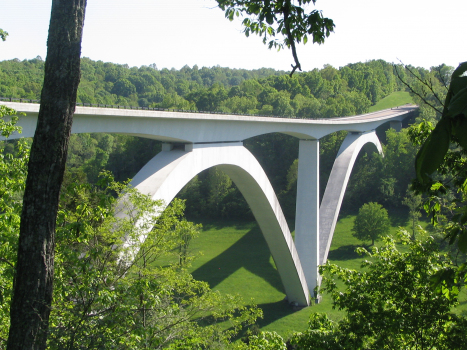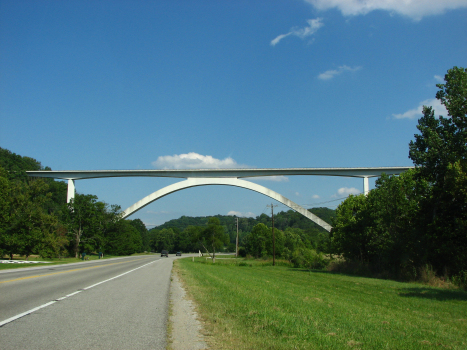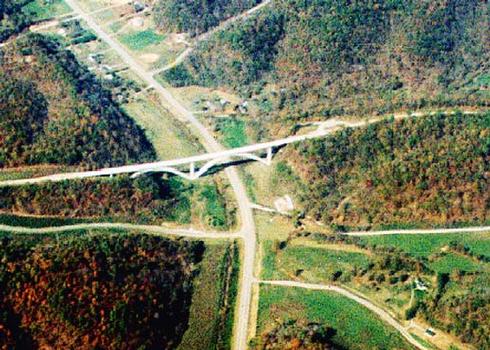General Information
| Other name(s): | Natchez Trace Parkway Arches |
|---|---|
| Completion: | 22 March 1994 |
| Status: | in use |
Project Type
| Structure: |
Deck arch bridge |
|---|---|
| Function / usage: |
Road bridge |
| Material: |
Prestressed concrete bridge |
| Support conditions: |
for registered users |
| Construction method: |
deck: Precast segmental construction |
| Material: |
Structurae Plus/Pro - Subscribe Now! |
| Construction method: |
arches: Precast segmental construction |
Awards and Distinctions
| 1995 |
Award of Merit
for registered users |
|---|
Location
| Location: |
Franklin, Williamson County, Tennessee, USA |
|---|---|
| Address: | Natchez Trace Parkway |
| Coordinates: | 35° 59' 10.71" N 86° 59' 31.40" W |
Technical Information
Dimensions
| width | 11 m | |
| height | 44 m | |
| total length | 479 m | |
| span lengths | 177 m - 140 m | |
| number of spans | 2 |
Cost
| cost of construction | United States dollar 11 300 000 |
Materials
| superstructure |
precast prestressed concrete
|
|---|---|
| piers |
precast concrete
|
| arches |
precast concrete
|
Excerpt from Wikipedia
The Natchez Trace Parkway Bridge is a concrete double arch bridge located in Williamson County, Tennessee, 8.7 mi (14.0 km) from the northern terminus of the Natchez Trace Parkway. It is 1,572 ft (479 m) long and carries the two-lane Natchez Trace Parkway 145 ft (44 m) over State Route 96 and a heavily wooded valley.
Background
The bridge, also known as the Natchez Trace Parkway Arches, is the first segmentally constructed concrete arch bridge in the United States. The arches comprise 122 hollow box segments precast in nearby Franklin, each of which was about 9.8 ft (3.0 m) long and weighed between 29 and 45 short tons. The deck consists of 196 precast post-tensioned trapezoidal box girder segments, each typically 8.5 ft (2.6 m) long. The sections atop the crown of the arch are 13 ft (4.0 m) deep. The foundations and piers of the bridge were cast in place.
The 582 ft (177 m) long main span is symmetrical, while the 462 ft (141 m) long second arch is not, due to the slope of the valley at the southern end of the bridge. The bridge is rare in that it does not use spandrel columns to support the deck from the arch. Rather than being evenly distributed along the arch's length, the weight of the bridge is concentrated at the crown of the arch. The lack of spandrel columns results in a clean, unencumbered appearance: it is termed a cathedral arch bridge.
The bridge was designed by Figg Engineering Group and built by PCL Civil Constructors Inc., a subsidiary of PCL Constructors Inc. The arches and deck were constructed using a balanced cantilever method. Each arch was supported by temporary cable stays anchored from the top of the piers and the valley sides until it was fully built. This procedure was chosen in place of conventional shoring towers so that environmental damage to the valley would be minimized. The bridge cost US$11.3 million to build, and was completed in October 1993. It was officially opened on March 22, 1994.
The bridge has won many awards for its design, including a Presidential Award for Design Excellence in 1995, and an Award of Merit from the Federal Highway Administration in 1996. The Eleventh International Bridge Conference named it the single most outstanding achievement in the bridge industry for 1994. The bridge "impressed the... jury with its aesthetically striking double-arch design, which shows exceptional sensitivity to the historical context of the site."
Suicide Bridge
Since its construction, the Natchez Trace Parkway Bridge has become known locally as a "suicide bridge". Suicide prevention signs were posted in 2011 but the deaths continue as the bridge's 32-inch railings do not deter jumpers. According to the Williamson County Sheriff, at least 32 people have successfully committed suicide by jumping from the bridge as of December 2018. The Natchez Trace Bridge Barrier Coalition was formed in September 2018 to work with federal congressional delegates and the National Park Service to install a suicide prevention barrier. Studies have shown that curbing access to impulsive and lethal means of suicide is a successful method of prevention.
Text imported from Wikipedia article "Natchez Trace Parkway Bridge" and modified on March 2, 2021 according to the CC-BY-SA 4.0 International license.
Participants
- Eugene C. Figg, Jr. (designer)
Relevant Web Sites
Relevant Publications
- (1997): Bridges. A history of the world's most famous and important spans. Black Dog & Leventhal, New York (USA), pp. 100-101.
- (2017): Bridges. A History of the World's Most Spectacular Spans. 2nd edition, Black Dog & Leventhal, New York (USA), ISBN 978-0316507943, pp. 100-101.
- (2002): Bridges - Ponts - Brücken. Atrium, Mexico City (Mexico), pp. 306-309.
- (1998): Brücken. Die Geschichte berühmter Brücken. Könemann, Cologne (Germany), pp. 100-101.
- : Les ponts. Une histoire des plus grands et plus célèbres ponts du monde. Könemann, Cologne (Germany), pp. 100-101.
- About this
data sheet - Structure-ID
20002401 - Published on:
18/11/2001 - Last updated on:
13/05/2021







